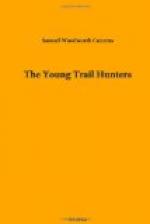One of the officers of the fort came to me, during the evening, with the request that I would permit a young lad to travel through with me to the Pacific coast, saying that he was without money or friends, and it would be a charity if I would allow him to work his passage.
I had but just returned to camp when Ned appeared, bringing with him a bright-looking Irish boy, about sixteen years of age. As he stood twirling his hat, and resting awkwardly upon one foot, I asked,—
“What do you want of me, my boy?”
“Av yez plaze, sur, I’d loike a job.”
“What kind of a job?”
[Illustration: Introducing Patsey.]
“A job ter go to Californy, shure, sur.”
“Well, what’s your name?”
“Patsey, yer honor; and a very good name it is, too. ’Twas my father’s before, me sur.”
“Where did you come from?”
“The ould counthry, ov coorse, sur.”
“Yes, but where did you come from now?”
“From the foort beyant, sur.”
“Well, Patsey, what can you do?”
“Phat can I do, is it? Faix, yer honor, it’s phat I can’t do yer’d better be axin’! There’s nothin’ in my loine that I don’t understand parfectly, sur.”
“Have you a recommendation?”
“What’s that, sur?”
“Any paper recommending you.”
“Och, it’s me characther, is it, yeze afther axin’ fur? Will, thin, I’ve gut it in me pocket, shure;” and, pulling out from the waistband of his pants a well-worn piece of greasy paper, he proceeded to spit on it, “jist for good luck,” he said, and then, with a bow and a scrape, handed it to me.
The paper was from Captain Givens, of the Mounted Rifles, recommending the bearer, Patsey McQuirk, as an honest but ignorant boy.
I informed Patsey that his “character” was satisfactory, and I would take him along, bidding him put his luggage in one of the wagons.
He stood looking at me with a comically puzzled expression on his face, and, thinking that perhaps he did not understand what I said, I again told him to put his things into one of the wagons, for we should probably start early in the morning.
“What things’ll I put in the wagin, sur?”
“Your baggage,—your clothes,” said I.
“Shure, sur, ef I put my clothes in the wagin, it’s little I’d hev to wear mysilf,” answered the boy.
“Well, well, then, go with Ned; he’ll show you what to do.”
It had been our intention to start early on the following morning; but, information having been received at the fort that a large party of Comanches had been seen, only two days before, on our direct route, it was thought advisable to wait a short time, in the hope that Don Ignacio and his train might overtake us. Nor did we wait in vain; for, on the evening of the third day, he rode into camp, and announced his train a short distance behind.
This was good news for us, and we immediately commenced preparations for our departure the following day.




